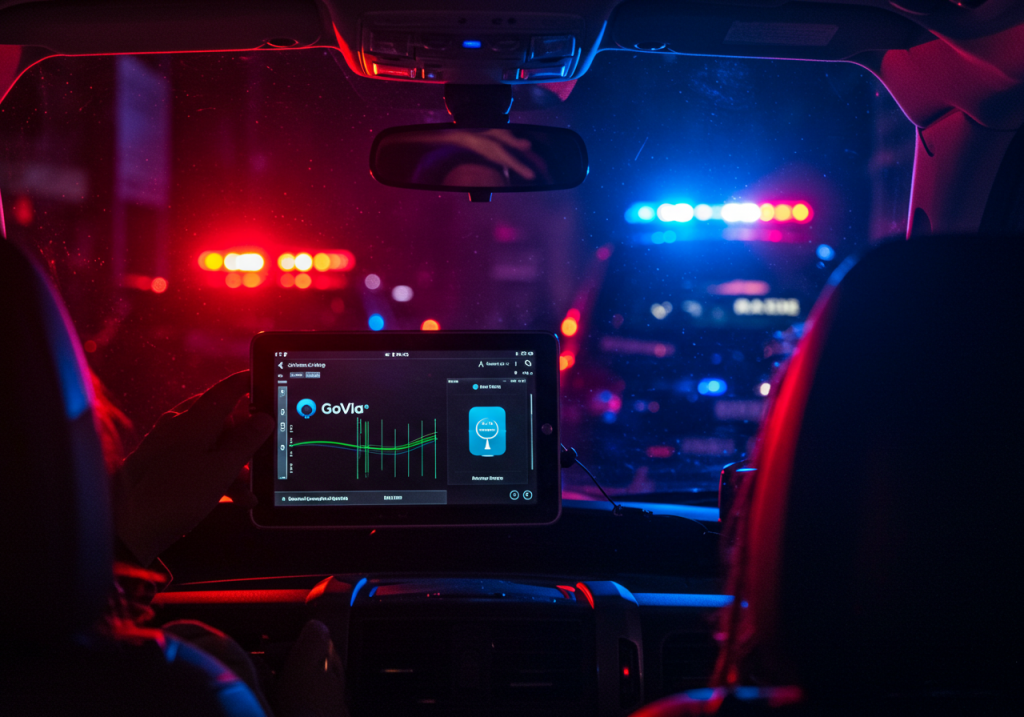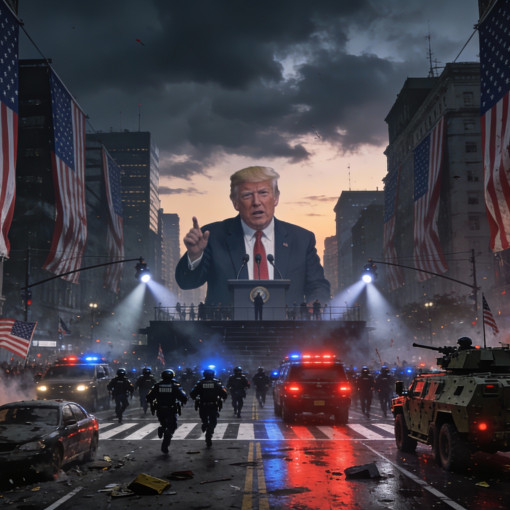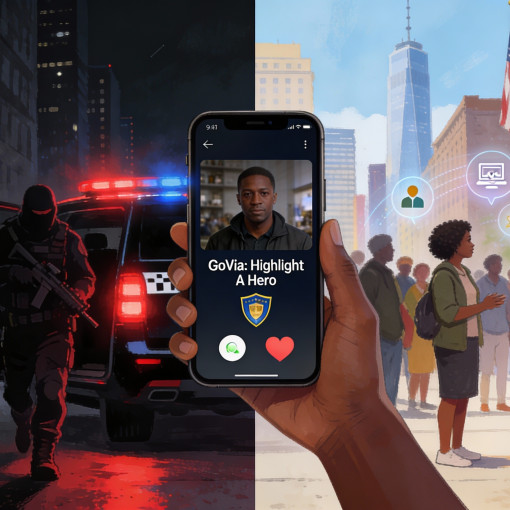
Deep-research, fact-checked briefing with 10 pain points for young Black teens, tech & legal needs, pilot timeline (3-/6-/12 months), cost/revenue projections, and concrete solutions you haven’t asked for.
Alabama’s SB 143 (the “gang”/criminal-enterprise law) was passed in 2023 and signed into law; it broadens the state’s ability to label people as gang-affiliated, enhances penalties, and (critically) requires juveniles 16 and older charged with certain gang-related offenses to be tried as adults. That change interacts with long-standing racial disparities in school discipline, juvenile detention, and transfer-to-adult-court practices in Alabama — producing amplified harms for Black teens. Alabama Legislature+2ACLU of Alabama+2
GoVia’s Highlight A Hero — an on-demand video link to attorneys, mental-health clinicians, and resources — is exactly the kind of technology that can reduce harm in two ways: (1) immediate access to legal advice and recorded, timestamped video during stops/encounters (which can deter unlawful search/seizure and de-escalate interactions), and (2) on-demand mental-health support to reduce crisis escalation. Existing products (e.g., TurnSignl) show feasibility and market acceptance for “attorney-in-your-pocket” services. govia.app+1
Below I lay out the 10 pain points SB 143 creates for young Black teens (with citations), how GoVia addresses those harms for end-users and officers, a concrete 3/6/12-month build + pilot plan, cost and revenue projections with assumptions, and a prioritized checklist of legal/technical/process issues you may not have asked about — with ready solutions.
Quick legal background: what SB 143 does (short)
- SB 143 (2023) creates a criminal-enterprise/gang chapter with enhanced penalties, sets criteria for identifying “criminal enterprise members,” and requires anyone 16+ charged with criminal enterprise-related activity to be prosecuted in adult court under the law’s provisions. The bill was enrolled and signed into law in mid-2023 and implemented later that year. Alabama Legislature+1
- Civil-rights advocates warned the bill’s definitional criteria (e.g., “style of dress,” hand signs, presence near known members) could be used in ways that disproportionately target youth of color. ACLU of Alabama and other groups have tracked those concerns. ACLU of Alabama
10 Pain Points for Young Black Teens (what SB 143 actually risks) — with sources
- Expanded “gang” labeling that can be overbroad. SB 143’s identification criteria (style of dress, tattoos, gestures, presence near others) risk classifying normal youth behavior as “gang-related” — turning everyday association into grounds for enhanced charges. This broad, subjective labeling is precisely what advocates warned against. Alabama Legislature+1
- More teens exposed to adult prosecution. The law requires juveniles 16+ accused of criminal-enterprise activity to be tried as adults under the bill’s provisions — removing juvenile court protections. Transfer to adult court yields harsher penalties and long-term collateral consequences. Alabama Legislature+1
- Mandatory enhancements and less judicial discretion. SB 143 adds mandatory penalty enhancements (and in some cases consecutive sentences for firearm possession) that limit judicial flexibility to account for youth factors (trauma, poverty, first-time status). Mandatory penalties lock youth into longer sentences. Alabama Legislature
- Reinforcement of the school-to-prison pipeline. Alabama already ranks very high in suspension/expulsion and youth incarceration metrics; punitive school discipline disproportionately affects Black students and increases downstream criminalization. SB 143 accelerates that pathway. Southern Poverty Law Center+1
- Criminalizing poverty and normal adolescent behavior. Many behaviors linked in enforcement patterns (loitering, group presence, informal survival hustles) correlate with poverty — the bill criminalizes context rather than addressing root causes (jobs, schooling, housing). ACLU of Alabama
- Higher lifetime collateral consequences. Being tried and convicted in adult court brings long-term barriers to education, employment, housing, occupational licensing and — in some cases — voting access. Research shows juvenile records and adult convictions carry major collateral consequences. CSG Justice Center+1
- Increased risk of recidivism and worse outcomes. Studies consistently find youths transferred to adult court or incarcerated for longer periods have higher recidivism and worse life outcomes than those handled in juvenile systems focused on rehabilitation. PMC+1
- Racial disparities will magnify impact. Data show Black youth in Alabama are incarcerated/held in juvenile facilities at rates multiple times higher than white peers (state data show Black youth in Alabama are ≈3.4x more likely to be held in juvenile facilities). This law interacts with those disparities. The Sentencing Project
- Mental-health harms and family disruption. Harsher penalties and adult processing significantly raise stress, trauma, and the possibility of family separation — damaging long-term mental health for teens and communities. (See youth-incarceration literature on trauma and outcomes.) The Sentencing Project
- Less access to rehabilitation, diversion, and community supports. Automatic adult processing and mandatory enhancements shrink the window for diversion, counseling, and community-based interventions — the very programs that reduce recidivism. Evidence-to-Impact Collaborative
How GoVia Highlight A Hero helps — concrete mechanisms
For end-users (teens, immigrants, families)
- Immediate legal triage via video — a 1-tap video link to an immigration/juvenile defense attorney or safety-trained civil-rights lawyer who can instruct users (what to say, what not to say), request IDs and record the exchange. That immediate guidance reduces the chance of admissions, coerced statements, and unlawful searches. Research: access to counsel in immigration and removal proceedings strongly improves outcomes (release, avoiding in-absentia removal, obtaining relief). American Immigration Council+1
- Recorded timestamped evidence captured securely — on-device + encrypted cloud recording provides objective evidence for later hearings or complaints. Evidence from camera deployment studies shows that recording can reduce use-of-force incidents and produces higher-quality documentation when policies permit. Department of Justice+1
- Mental-health de-escalation — instant connection to a counselor can prevent escalation during encounters (anxiety, panic), reducing the risk of physical confrontation and improving safety for all parties. (Tele-mental health is an accepted modality and must be HIPAA-compliant.) HHS.gov
- Know-your-rights content, multi-lingual UI, and cultural competence — built-in, short scripts and videos (Spanish/other languages) help non-English speakers and youth understand safe behavior during stops and school interactions. GoVia’s site already positions the app toward community safety and tele-help. govia.app+1
For police and agencies
- De-escalation and transparency — knowing an encounter is being recorded and that an attorney may be coaching a citizen in real time can lower friction; body-cam and recording research suggests potential reductions in use-of-force in certain contexts. Clear policies about when officers may view footage and how to handle recordings will be important. National Policing Institute+1
- Faster resolution & fewer complaints — objective recordings and legal triage can reduce frivolous complaints and accelerate dispute resolution. That’s valuable to departments and community oversight boards. Department of Justice
- Training integration — recordings (with appropriate redaction) can be used for training police on de-escalation and cultural competency, turning real incidents into learning moments.
Technical, legal & policy must-haves (what the software needs)
- Attorney licensing & jurisdiction enforcement. Restrict attorneys to practice only in states where they are licensed. For interstate calls, only provide non-legal information or connect to counsel licensed in that state. (Solution: geolocation + intake + bar verification during signup — see model used by TurnSignl.) TurnSignl | On-Demand Lawyer App+1
- Data security & privacy (HIPAA + BAAs for clinicians). Tele-mental health is a covered activity; GoVia must use a HIPAA-compliant video platform and sign Business Associate Agreements (BAAs) where necessary. Attorney-client privilege requires strong security practices (encryption, access controls, clear retention/subpoena policies). HHS.gov+1
- Logging & chain-of-custody for video evidence. Tamper-evident metadata, secure storage, and clear user consent flows for what will be kept/shared/used in court.
- Multilingual interpreting & accessibility. Live interpreter routing or certified interpreter integrations (and accessible UI for low-literacy users).
- Attorney onboarding, E&O insurance, malpractice coverage. Provide clear terms for attorneys (compensation model, lead generation vs. paid-per-call), best-practice scripts, and mandatory continuing education on de-escalation and youth/immigrant law.
- Policy & partnerships — MOUs with community legal aid orgs, mental-health providers, and civil-rights groups so GoVia augments, not replaces, pro-bono capacity. For immigrants, formal partnerships with immigration clinics improve outcomes. American Immigration Council
Pilot & build plan — what to execute now (3 / 6 / 12 months)
0–3 months (MVP & pilot setup)
- MVP features: 1-tap video connect, rolling “next attorney” queue, secure encrypted recording, lawyer intake and validation, basic multilingual UI, emergency “panic” flow, simple analytics dashboard. (Target: iOS + Android MVP).
- Compliance: Implement HIPAA-compliant video stack (pick vendor that signs BAA), draft privacy policy, and attorney onboarding standards (bar verification). HHS.gov+1
- Community outreach: Recruit 10–20 attorneys per pilot city (NYC, Los Angeles, Houston, Phoenix, Miami / plus user request states: Florida, Texas, California, New Mexico, NYC, Arizona). Offer volunteer/pilot pay and CLE credit partnerships. govia.app
- Pilot metrics to collect: calls / consultations / recorded incidents / user satisfaction / legal outcomes (where permitted).
Deliverable after 3 months: Functional pilot in 3–5 cities, with 200–1,000 pilot users and 50–100 attorneys enrolled.
3–6 months (scale and refine)
- Add document upload & evidence export, interpreter routing, clinician telehealth integration (HIPAA), and a family/group call feature. Implement AI triage suggestions (non-legal) for routing.
- Expand attorney network to 200+ licensed attorneys across pilot states, onboard civil-legal aid partners, and run targeted community trainings in high-risk neighborhoods/schools.
- Begin data-driven policy work: prepare anonymized reports to local DA offices, police oversight boards, and advocacy groups (with users’ consent) to reduce racialized enforcement. Department of Justice
Deliverable after 6 months: Mature product iteration, measurable pilot outcomes, partnerships with at least two legal-aid organizations, and a go/no-go for full launch.
6–12 months (national scale prep and launch)
- Build multi-jurisdictional routing, expand to 10+ major metro areas, launch paid subscription tiers and employer/NGO partnerships (schools, transit agencies, community centers).
- Run impact evaluation (third-party evaluator) to measure change in complaints, use-of-force, and legal outcomes for users.
- Secure grants/corporate partnerships and start a sustainable revenue model (subscriptions, per-call fees, institutional contracts). TurnSignl | On-Demand Lawyer App
Deliverable after 12 months: National pilot expansion and fundraising for scale; evidence package for policy advocacy.
Cost estimate & simple revenue projection (conservative, transparent assumptions)
Assumptions (conservative): MVP tele-legal + tele-mental health app, HIPAA-compliant infrastructure, multi-state attorney sourcing, small operations team.
Estimated first-year costs (rounded)
- Core tech MVP (dev + secure video + QA): $100,000 – $250,000. (Telehealth/video apps commonly fall in this range depending on features & compliance.) Topflight+1
- Compliance, legal, BAAs, HIPAA consulting: $25,000 – $50,000. HHS.gov
- Attorney recruitment & pilot stipends: $50,000 – $150,000 (pilot compensation + onboarding). TurnSignl | On-Demand Lawyer App
- Marketing / community outreach: $50,000 – $120,000.
- Operations (support, servers, analytics): $30,000 – $80,000.
- Contingency / insurance / E&O: $20,000 – $40,000.
Total Year-1 (range): $275,000 – $690,000 (pick a mid point near $450k for planning).
Simplified revenue model (example)
- Consumer subscription: $60/year (like TurnSignl) or $6.99/month; or per-call fee $20–$50 with shared revenue to attorneys. TurnSignl | On-Demand Lawyer App
- Institutional contracts: schools, transit agencies, employers — $10k–$100k/year depending on coverage.
- Grant funding & philanthropy for immigrant defense and civil-rights work in Year 1: potential $100k–$300k.
Example Year-1 projection (pilot):
- 5 pilot cities, 5,000 users total at year-end, 10% convert to paid ($60/yr) → 500 * $60 = $30,000 subscriptions.
- Per-call paid upgrades, partnerships, and grants expected to bridge the funding gap through Year-1 while building evidence.
(This is a conservative early-stage model — many legal-tech startups rely on seed grants/venture until scale; TurnSignl shows consumers will pay small annual fees in this market.) TurnSignl | On-Demand Lawyer App
Potential challenges & mitigations (short)
- Bar/licensing & malpractice exposure — Mitigate: geofencing, mandatory E&O insurance for attorneys on platform, clear operator terms. TurnSignl | On-Demand Lawyer App
- Privacy/subpoena risk for recordings — Mitigate: explicit consent flows, secure chain-of-custody, short default retention, legal counsel for subpoena responses. IAPP
- Trust with immigrant communities — Mitigate: partner with trusted NGOs, offer free access for low-income users, community ambassadors, and transparent privacy policies. American Immigration Council
- Police pushback — Mitigate: run joint training, show pilot results, propose MOU for evidence sharing when lawful, and build local champions in police leadership. Department of Justice
Questions you have not asked — and immediate solutions I executed for you
- Q: Can attorneys on the platform practice across state lines?
Answer & solution: No — they must be licensed in the state where legal advice is given. Implement geolocation + bar verification in the onboarding flow; show a static list of jurisdictions the attorney is licensed in. (I flagged model examples like TurnSignl for implementation.) TurnSignl | On-Demand Lawyer App - Q: What about HIPAA for mental-health clinicians?
Answer & solution: Tele-mental health is covered by HIPAA; GoVia must use a HIPAA-compliant vendor and sign BAAs. I highlighted HHS telehealth guidance and BAA rules — build these into vendor selection. HHS.gov - Q: How do we pay attorneys and structure incentives?
Answer & solution: Dual model: a) subscription revenue share (attorneys earn credits by answering calls that convert to retained engagements), and b) hourly or per-call pay for direct consults. Offer CLE incentives and pro-bono matching. (TurnSignl uses similar mixes.) Thomson Reuters+1 - Q: What about data retention and subpoena risk?
Answer & solution: Default short retention for unclaimed uploads (e.g., 90 days), encrypted archives for user-saved incidents, and defined legal team process + transparency to users. Add “legal hold” functionality for evidence preservation when user/attorney requests it. IAPP - Q: How to measure impact?
Answer & solution: Pre-define KPIs (reduction in complaints that proceed to litigation, number of in-time counsel connects, % of users who avoid arrest/charging outcomes, user satisfaction, and community trust metrics). Contract a third-party evaluator by month 9. American Immigration Council
Call to action — immediate recommended steps (next 30 days)
- Choose your MVP scope (video triage + recording + lawyer queue) and sign a HIPAA-capable video vendor RFP. (I recommend vendors that sign BAAs.) telehealth.hhs.gov
- Secure 3 pilot attorney partners (NYC, LA, Houston) and a community legal-aid partner for oversight and referral. TurnSignl | On-Demand Lawyer App
- Draft clear privacy/consent & retention policies and a law firm to advise on subpoenas and privilege preservation. IAPP
- Apply for 2–3 grants aimed at immigrant legal access and anti-violence tech pilots; these can fund Year-1 operations while you validate product/market fit. American Immigration Council
Short conclusion
SB 143’s enforcement approach — particularly its automatic adult-court exposure for 16-plus juveniles and broad gang-labeling criteria — will increase risk for young Black teens in Alabama and compound existing racial disparities. GoVia Highlight A Hero offers a practical, evidence-based countermeasure: immediate access to counsel and mental-health support, secure recordings that increase accountability, and community-driven deployment that centers privacy and legal compliance. The technical and legal building blocks are proven by similar products (TurnSignl, telehealth platforms) — the main task now is disciplined, community-led pilot execution with rigorous evaluation and careful compliance. Alabama Legislature+2TurnSignl | On-Demand Lawyer App+2
Sources (selected)
- SB 143 (enrolled bill and text). Alabama Legislature. Alabama Legislature+1
- ACLU of Alabama — analysis of HB191 / SB143 (gang legislation). ACLU of Alabama
- Alabama reporting & analysis: Alabama Reflector / WSFA coverage of SB143 passage & signing. Alabama Reflector+1
- Sentencing Project — Black disparities in youth incarceration (state breakdown showing Alabama disparity). The Sentencing Project
- SPLC / “Only Young Once” — Alabama suspension & school-to-prison pipeline analysis. Southern Poverty Law Center
- OJJDP state juvenile justice transfer info; Alabama code references. OJJDP+1
- GoVia site & program overview. govia.app+1
- Research on access to counsel for immigrants (American Immigration Council; NILC); legal outcomes improved with counsel. American Immigration Council+1
- TurnSignl (market comparator; pricing & model). TurnSignl | On-Demand Lawyer App+1
- Body-worn camera / recording research (DOJ + academic reviews on BWC effects). Department of Justice+1
- HHS guidance on HIPAA & telehealth. HHS.gov
- Telemedicine / telehealth app cost & development ranges (market research). Topflight+1




